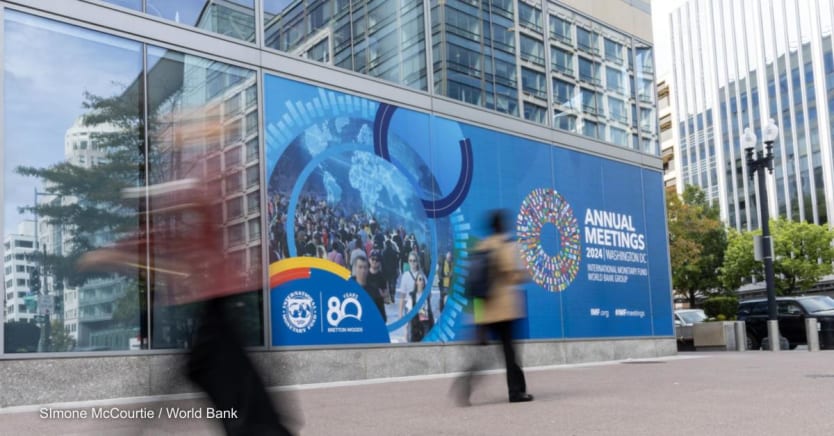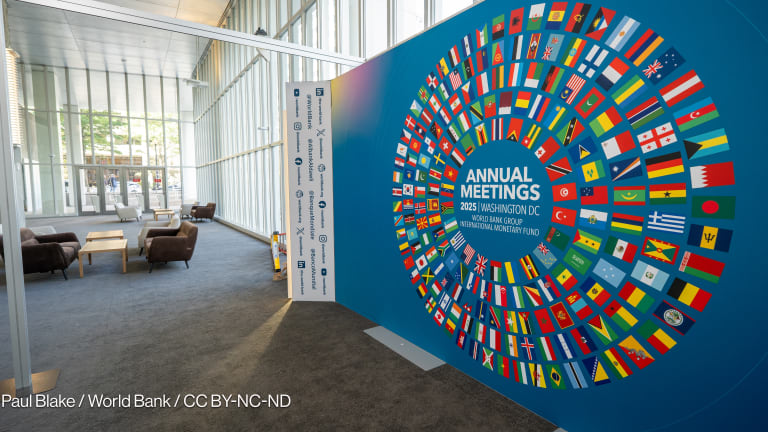Annual meetings special edition: Ajay Banga’s big vision for the World Bank

For 16 months, World Bank President Ajay Banga has had his sleeves rolled up and his hands on the plumbing of an 80-year-old institution in need of some updates. Now, Banga says, it is time to “turn the page and look to the future.”
And he knows what he wants the World Bank’s next chapter to be.
Also in today’s edition: Reporting back on some of the key issues we told you to watch at this year’s World Bank annual meetings, plus a rainbow.
Post-evolution future
At the end of a dizzying week, I’m always startled on Friday at the World Bank-International Monetary Fund annual meetings plenary when the chair officially calls the meetings to order. After five days of interviews, side events, flagships, podcasts, off-the-record meetups, and a whole bunch of newsletters, at this point I am basically just a (barely) walking shot of espresso. And yet somehow we’re just getting started?
But at the plenary this year, the Friday call to order felt fitting. For the bank’s members it kicked off some official annual meetings business. But for Ajay Banga, it marked the moment when the World Bank’s attention must shift from internal reforms to a big vision for ending poverty.
The first year-and-a-half of Banga’s presidency has been a step-by-step slog through the inner workings of the world’s largest multilateral development bank, or MDB. He’s overseen tweaks and changes to scorecards, equity-to-loan ratios, approval processes, and lending practices so the bank can work faster and more effectively.
No one is claiming the work of building a bigger, better bank is finished, but for Banga, it is time to change focus from the long “evolution” to-do list and back onto the world. And under his leadership, that is going to mean one big thing: Jobs.
“The World Bank Group is poised to embark on the next phase of our mission: Ensuring job creation and employment are not the byproduct of our projects but an explicit aim of them,” he said.
The emphasis on job creation was a thread that ran through the entire annual meetings week. Friday’s speech was when Banga made it explicit that his post-evolution vision for the World Bank is about closing the gap between the number of jobs the world’s population will need and the number of jobs that exist.
“The specter of unemployment looms large, potentially leaving 800 million young people without meaningful employment, and threatening to destabilize societies and hinder economic growth. The gravity of this challenge cannot be overstated any more than the potential of this generation to change the world for good,” he said.
Banga pledged to put the tools of the World Bank Group in the service of job creation. He has already assembled a High-Level Advisory Council on Jobs led by Singapore’s President Tharman Shanmugaratnam and former Chilean President Michelle Bachelet, which met for the first time last week.
And the big bet of Banga’s presidency is that all the heads-down work he’s been doing for the last 16 months has resulted in a World Bank that is now capable of “giving the young people growing up today the best chance of a life of dignity.”
“Because we are faster, simpler, and more impact-oriented, the World Bank Group, and our people, are better able to respond,” he said.
In other words, it’s time to get to work.
Related reading: An insider’s view of World Bank reform
+ Catch up on our coverage of the World Bank-IMF annual meetings.
Keeping score
Heading into the meetings, my colleague Adva Saldinger previewed some of the key issues to watch. Here’s her roundup of what happened — or didn’t — in a few big areas:
• Debt: If you were betting the annual meetings would make major progress on addressing the mounting debt distress facing many countries, unfortunately it’s time to pay up. No major decisions were made on any of the proposals we outlined, or to fix the existing Common Framework process for debt resolution. Eric LeCompte of Jubilee USA Network tells Adva he’d hoped to see some agreement by the Group of 20 largest and emerging economies on “low-hanging fruit” like debt swaps, but no such luck.
• IDA: Spain made sure the International Development Association, the World Bank’s fund for low-income countries, didn’t walk away totally empty-handed, pledging €400 million ($432.9 million), a nearly 40% increase over its last contribution. A couple concerns were repeatedly raised at last week’s IDA Forum, according to people who were present. One was around increasing the size of the IDA Private Sector Window, intended to drive more private sector funding to IDA countries through the bank’s private sector and guarantee arms. Another was about potential backsliding on gender commitments in the IDA policy package that is currently under discussion.
• Reforms: The World Bank spent the week showing off its new corporate scorecard: including with a glitzy digital display in the main atrium. This is the set of indicators the bank uses to evaluate its programs — which Banga has pared down from 150 to 22. But as they dig deeper into the scorecard’s details, bank watchers are beginning to wonder if the simplification process has come with some trade-offs. For example, on gender, the scorecard makes some troubling assumptions. Where gender-disaggregated data isn’t available, the bank is basing its calculations on the assumption that 50% of programs will support women, despite plenty of research to show that women are harder to reach, says Mary Borrowman, a policy fellow at the Center for Global Development, in a special edition of Devex’s podcast series.
Some civil society representatives were puzzled that a corporate scorecard about development doesn’t include an indicator for structural transformation of a country’s economy. The bank has pointed to the jobs indicator as a stand-in, but not everyone is convinced.
Background reading: 5 things to watch at the World Bank-IMF annual meetings
Don’t miss: The World Bank’s IDA replenishment — the money, the odds, the high stakes
🎧 Listen: Catch up on all the episodes of Adva’s special podcast coverage of the annual meetings.
Everybody get together
“African governments are saying we need regional integration. Let's help them make it a reality.”
— Mavis Owusu-Gyamfi, president and CEO, African Center for Economic TransformationThe World Bank’s “evolution” reform efforts have been critical, but the institution could do more to align its approach with the aspirations of its borrowers, according to a panel of MDB experts who spoke at our Devex World summit last week.
Read: Experts call for innovative ways for the World Bank to work better (Pro)
+ Not yet a Devex Pro member? Start your 15-day free trial today to access all our expert analyses, insider insights, funding data, exclusive events, and more. Check out all the exclusive content available to you.
Power play
My colleague Ayenat Mersie managed to find a spot at the bank’s event for Mission 300, a six-month-old initiative launched with the African Development Bank that aims to connect 300 million more people in Africa with electricity by 2030. The room was so crowded that World Bank employees were told to go back and watch the livestream at their desks.
Africa remains the only region where the energy access gap hasn’t significantly decreased. Access is barely keeping pace with population growth. As part of the initiative, 14 countries are developing national energy compacts focused on increasing access to electricity and clean cooking, with pillars like improving infrastructure, boosting regional integration, and incentivizing private investment.
The event featured power and energy ministers from Nigeria, Senegal, Ivory Coast, and Tanzania, which will also host the next major meeting on this initiative in January 2025. By then, the next cohort of countries is expected to be ready to join the effort, according to Kevin Kariuki, vice president for power, energy, climate, and green growth at AfDB.
ICYMI, Ayenat also reported on the World Bank’s new big bet on agribusiness.
Rainbow connection
Last month, Ajay Banga and IMF Managing Director Kristalina Georgieva traveled with other leading multilateral thinkers to Bretton Woods, New Hampshire, in the United States, to celebrate their institutions’ 80th birthdays and reflect on the future.
In her plenary speech on Friday, Georgieva shared that for most of their two-day visit, the skies over Bretton Woods were dark and gloomy.
“But then suddenly the sun broke through, and Mother Nature gifted us a gorgeous double rainbow,” she said.
“To us, that was a great omen — and a reminder that the sun is always there, it is only the clouds that come and go,” she said. “Our founders have left us a legacy to see through darker times. And so we will — because we know it can be done.”
ICYMI: A scorecard for Kristalina Georgieva’s IMF leadership
See also: At 80, Bretton Woods needs a makeover to fight climate change
Sign up to Newswire for an inside look at the biggest stories in global development.
Search for articles
Most Read
- 1
- 2
- 3
- 4
- 5








